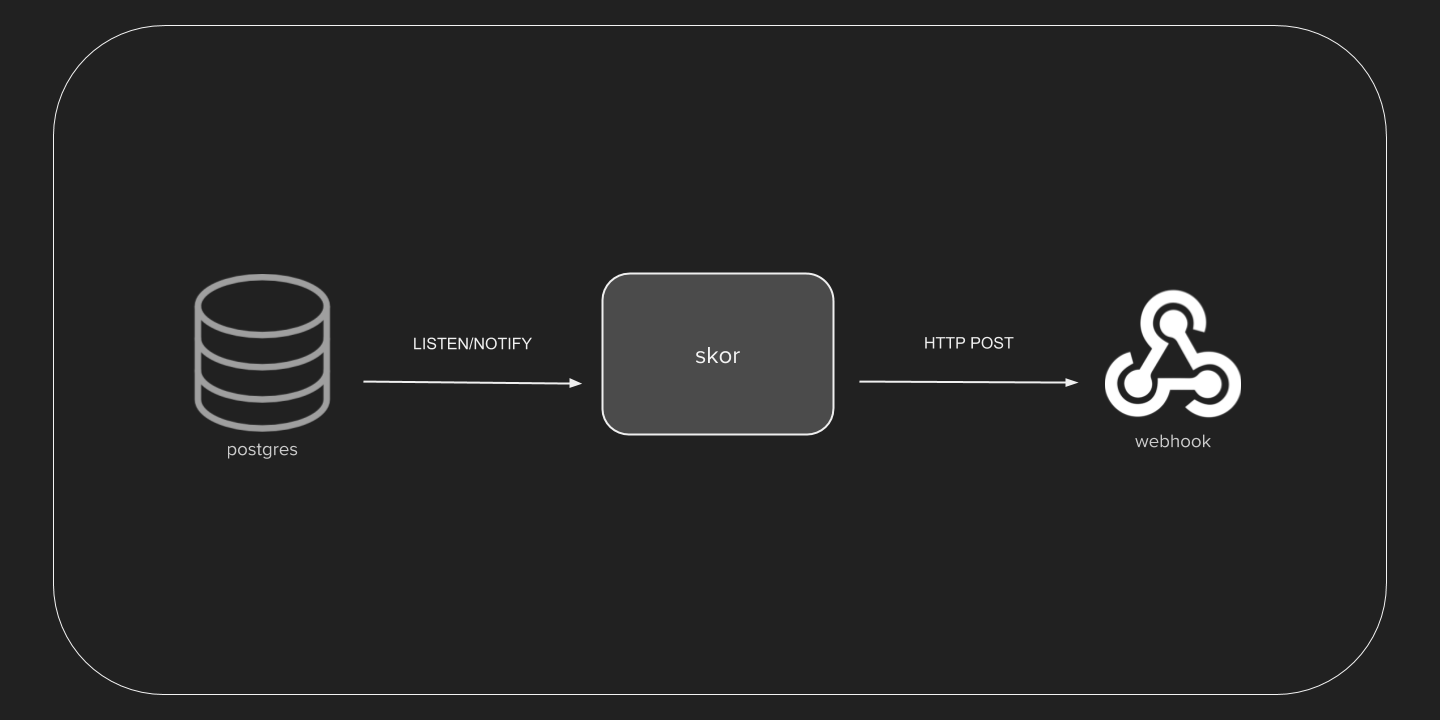skor is a utility for PostgreSQL which calls a webhook with row changes as JSON whenever an INSERT, UPDATE or DELETE event occurs on a particular table. It comprises of a PostgreSQL trigger function and the C program skor that listens to database notifications and invokes the webhook with a JSON payload.
- When you want to trigger an action in an external application when a table row is modified.
- When you want a lightweight notification system for changes in the database.
- When you want to send the changes to a message queue such as AMQP, Kafka etc.
A PostgreSQL stored procedure is set up as a trigger on the required table(s). This trigger uses PostgreSQL's LISTEN and NOTIFY to publish change events as JSON to a notification channel. Skor watches this channel for messages and when a message is received, it makes an HTTP POST call to the webhook with the JSON payload. The webhook can then decide to take an action on this.
- Events are only captured when skor is running.
- If a call to the webhook fails, it is not retried.
Use the init.sh script to create the trigger and add it to the tables for which you want to get change events.
$ ./init.sh table1 table2 | psql -h localhost -p 5432 -U postgres -d postgres --A pre-built Docker image with the skor binary is available at hasura/skor.
Run it as:
$ docker run \
-e DBNAME="postgres" \
-e PGUSER="postgres" \
-e PGPASS="''" \
-e PGHOST="localhost" \
-e PGPORT=5432 \
-e WEBHOOKURL="http://localhost:5000/" \
--net host \
-it hasura/skor:v0.1.1Make sure you use the appropriate database parameters and webhook URL above.
Query:
INSERT INTO test_table(name) VALUES ('abc1');JSON webhook payload:
{"data": {"id": 1, "name": "abc1"}, "table": "test_table", "op": "INSERT"}Query:
UPDATE test_table SET name = 'pqr1' WHERE id = 1;JSON webhook payload:
{"data": {"id": 1, "name": "pqr1"}, "table": "test_table", "op": "UPDATE"}Query:
DELETE FROM test_table WHERE id = 1;JSON webhook payload:
{"data": {"id": 1, "name": "pqr1"}, "table": "test_table", "op": "DELETE"}The pre-built Docker image with the skor binary is available at hasura/skor and can be deployed as a microservice with the sample k8s.yaml in this repo.
The webhook can be another microservice that exposes an endpoint.
To learn more on deploying microservices on Hasura you may check out the documentation.
- PostgreSQL 9+
gcc- libcurl (
libcurl4-openssl-dev) - libppq (
libpq-dev)
$ make$ ./build/skor 'host=localhost port=5432 dbname=postgres user=postgres password=' http://localhost:5000The test runs skor and a python-flask server for the webhook.
Make sure you have installed python-flask and have Postgres running on localhost:5432 before running the test.
You can modify the Postgres credentials in the test.py file.
Run the test (present in the root directory) as:
$ python test.pyContributions are welcome!
Please check out the contributing guide to learn about setting up the development environment and building the project. Also look at the issues page and help us in improving Skor!
